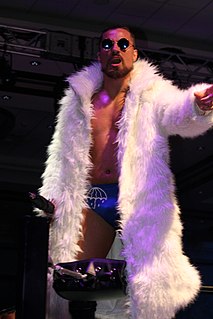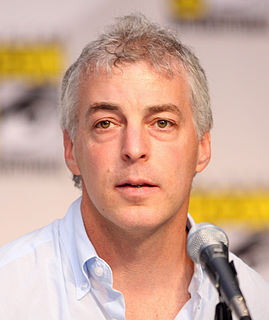A Quote by Jed Mercurio
What makes an audience watch something and care about the characters is the emotional life of the characters.
Quote Topics
Related Quotes
What interests Sam Mendes are characters and relationships, and he was a genius at giving you the freedom to create the type of character you want, and also to explore and have fun with your fellow actors. For him, characters and relationships are really the heartbeat of the film, and then the action is the backdrop. By developing the characters, he makes you care that much more about the action and going on a journey with the characters.
When writers are self-conscious about themselves as writers they often keep a great distance from their characters, sounding as if they were writing encyclopedia entries instead of stories. Their hesitancy about physical and psychological intimacy can be a barrier to vital fiction. Conversely, a narration that makes readers hear the characters' heavy breathing and smell their emotional anguish diminishes distance. Readers feel so close to the characters that, for those magical moments, they become those characters.
The first thing, when I read the script, is that I need to care about what happens and feel compelled by the story and engaged by the characters. It needs to resonate with me, even if what the characters are going through is not something that I have experienced in my life. I have to feel like it has some sort of meaning to me.
I have always liked kind of outsider characters. In the movies I grew up liking, you had more complicated characters. I don't mean that in a way that makes us better or anything. I just seem to like characters who don't really fit into. You always hear that from the studio: "You have to be able to root for them, they have to be likeable, and the audience has to be able to see themselves in the characters." I feel that's not necessarily true. As long as the character has some type of goal or outlook on the world, or perspective, you can follow that story.
If I can get the audience to connect with the characters emotionally - and they love who they are, they love the larger-than-life situation that they're in, but most of all get the audience invested in the characters - then I always feel like I can sort of put them in the most outrageous circumstances, and the audience is okay to go with that.
I see this with experienced writers, too: They worry so much about the plot that they lose sight of the characters. They lose sight of why they are telling the story. They don't let the characters actually speak. Characters will start to dictate the story in sometimes surprising, emotional, and funny ways. If the writers are not open to those surprises, they're going to strangle the life, spark, or spirit out of their work.
What makes 'Hoop Dreams' such a powerful film, is that it carries a message that maybe we can do something about our problems in America, reflected in the resiliency and strength of those families that we portrayed. The film was where we really saw the characters that we care about, interwoven with a analysis that is trying to help the audience understand what is happening in these people's lives. And in what is happening, there is an understanding of the larger power relationships in the world.
What's actually amazing is that, after a couple of years of living with characters and writing characters and talking about characters, as we sit in the writers room and break episodes, it strikes you, every once in awhile, that you're talking about a character that's played by the same actor, who you've been talking about forever. We talk about a character dying, so you get emotional, and then you realize, "Oh, but wait, that actor is still on the show."
The challenge in writing a show that's about people and their flaws is that it can easily tip over - okay, I'll sometimes watch something, and there will be characters that are written in a way that I'll know that the writer just hates human beings. They're expressing this misanthropic point of view with these detestable characters.






































